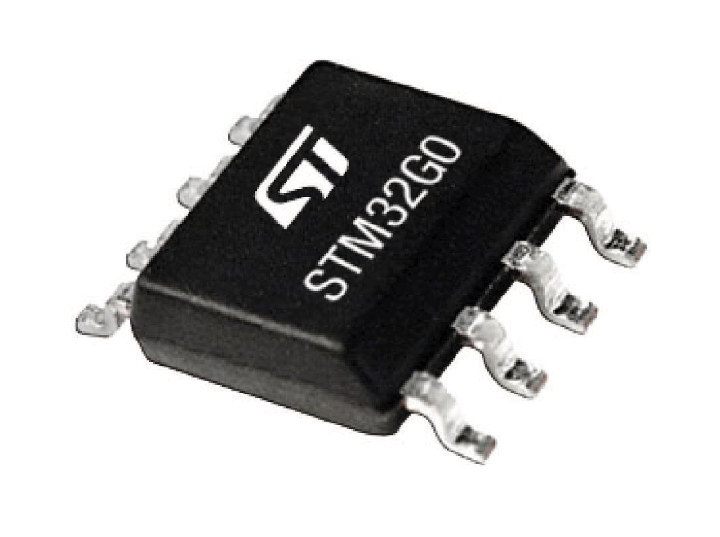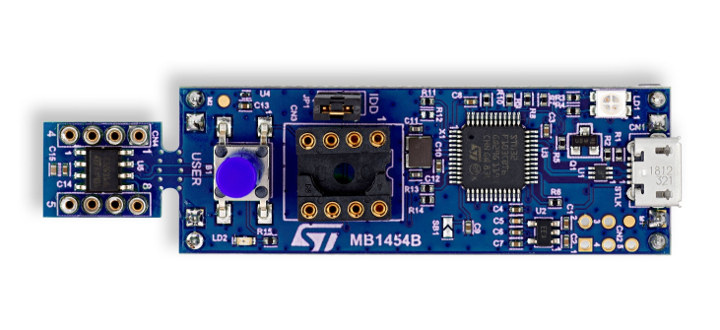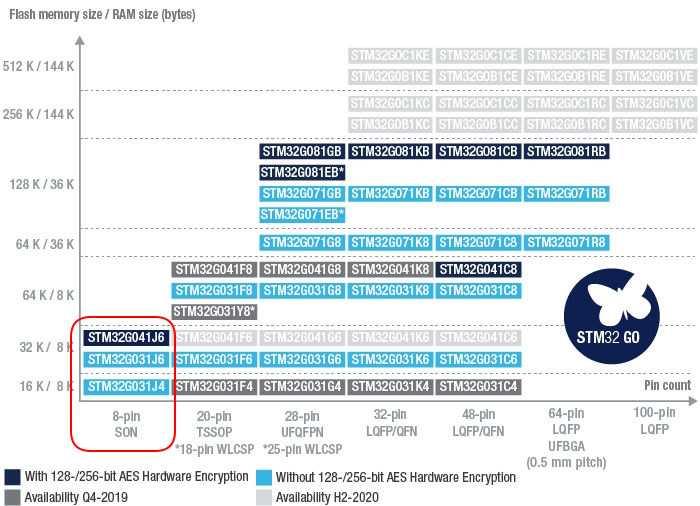At the end of last year, STMicro introduced what they claim is the first 90nm mainstream microcontroller with STM32G0 Arm Cortex-M0+ MCU clocked at 64 MHz.
At the time, the family included parts with 24, 32, 48 and 64 pins packages, but there were also plans for 8-pin and 100-pin STM32G0 microcontrollers. The company has now just announced availability for the first 8-pin STM32 microcontrollers thanks to four new STM32G0 SKUs with up to 8KB RAM and 32KB flash in an SO8N package.
 The 90nm process node and simpler design make the new microcontrollers most suitable for cost & energy-conscious applications governed by battery-capacity limits, eco-design legislation, or market expectations such as appliance energy ratings.
The 90nm process node and simpler design make the new microcontrollers most suitable for cost & energy-conscious applications governed by battery-capacity limits, eco-design legislation, or market expectations such as appliance energy ratings.
8-pin STM32 Microcontrollers Available Now
STM32G030J6 is part of STM32G0 Value Line with 32KB flash and 8KB memory, as well as 6 I/O pins supporting GPIO, SPI, I2C, and UART outputs.
 STM32G031J6, STM32G031J4, and STM32G041J6 Access Line MCUs are also available in SO8N (6 x 4.9mm), with 16 to 32KB flash & 8 KB RAM and similar I/O options, but offering additional functionality depending on model such as hardware AES acceleration, Securable Memory Area enabling secure boot or firmware update, extra timers, and 96-bit unique device ID.
STM32G031J6, STM32G031J4, and STM32G041J6 Access Line MCUs are also available in SO8N (6 x 4.9mm), with 16 to 32KB flash & 8 KB RAM and similar I/O options, but offering additional functionality depending on model such as hardware AES acceleration, Securable Memory Area enabling secure boot or firmware update, extra timers, and 96-bit unique device ID.
The 8-pin STM32G0 MCUs are available now with prices starting at $0.31 for 1000-piece orders of the STM32G030J6 Value Line MCU. If you wonder about the other end of the scale with the 100-pin MCU, we’ll have to wait for H2 2020 for mass production and they’ll come with up to 512 KB flash and 144 KB RAM.
8-pin Discovery kit STM32G0316-DISCO

You can get started easily and cheaply ($9.90) with the new 8-pin STM32 microcontrollers thanks to STM32G0316-DISCO discovery kit that comes with the following key features:
- MCU – STMicro STM32G031J6 Arm Cortex M0+ core-based MCU with 32 Kbytes of Flash memory and 8 Kbytes of SRAM, in SO8 package
- Misc – 1x user LED, 1x reset/user push-button
- Individual and breakable STM32 SO8 to DIL8 module (left)
- DIL8 socket to ease programming of the STM32 MCU (center)
- USB – 1x micro USB ST-LINK port
- Debugging – On-board ST-LINK/V2-1 debugger/programmer with Virtual COM port and debug port
The board is supported by free software libraries and examples available with the STM32Cube, and the MCU also supported various 3rd-party Integrated Development Environments (IDEs) such as IAR, Keil, and GCC-based IDEs.
You’ll find more details, including purchase links and documentation, on the MCUs and devkit respective product pages.

Jean-Luc started CNX Software in 2010 as a part-time endeavor, before quitting his job as a software engineering manager, and starting to write daily news, and reviews full time later in 2011.
Support CNX Software! Donate via cryptocurrencies, become a Patron on Patreon, or purchase goods on Amazon or Aliexpress






> 8-bit STM32 Microcontrollers Available Now
I think you mean 8-pin
Yes. I made that mistake several times while writing, but I thought I have captured all typos before clicking publish. Apparently not.
Cool, more 8 pin micros, please! LPC800 was popular in its own way.
Glad to see they didn’t forget a discovery board too 🙂
I don’t know too much about this stuff but the landing page says:
“STM32G0 is also the world first general purpose ARM Cortex-M microcontroller to support USB-C and Power Delivery (UCPD) thanks to two UCPD interfaces”
And yet the discover board is using micro USB.. A bit weird
Not that I had anything in particular in mind 🙂
I am pretty sure that on the Discovery board, the micro USB port is connected to the ST-Link debugger that also provides a serial port. And it is probably a stm32F1, so no USB-C support on it.
Yet another incremental step toward displacing 8 bit microcontrollers in the marketplace.
It will still take some time but at some point, 8 bit will likely become the more expensive option due to lower production volume.
This is awesome. The MCU form factor has always been what kept me away from STM32. Now will be time for me to discover them and see if they’re as pleasant to use as ATTINY13/85. With much more RAM and flash in the same form factor, and native I2C/SPI/UART interfaces I guess this will be great!
More RAM and flash are needed just to store the longer opcodes.
I suspect the biggest influence on cost is production volume. If 32 bit is able to tip this more in it’s favor, 8 bit days will be numbered.
> More RAM and flash are needed just to store the longer opcodes
Sure but not always. Simply using uint16_t (or worse, uint32_t) in AVR results in huge code dealing with multiple registers and complex operations to combine them. So it is actually possible not to increase code size in some programs I guess, especially when considering how compact Thumb-2 is in general.
I cannot find information about which STM32G0 MCUs support USB-PD (UCPD). According to https://www.st.com/en/microcontrollers-microprocessors/stm32g0-series.html the whole STM32G0x1 Access line support this but I have some doubts.
Do you know what technique is used to reprogram the device once the 6 I/Os are in use?
see: https://st-onlinetraining.s3.amazonaws.com/STM32G0-System-Debug-%28DBG%29/index.html
DIP format please!
It would be nice, but they don’t seem to have plans for it (yet). If I understand correctly, the discovery board allows something similar though. You can break the breakout board, and solder you own headers to use it with a breadboard. Once your done it can be inserted back into the 8-pin socket on the board.
Use converter boards from AliExpress; they’re dirt cheap
Any way to bitbang USB?
Absolutely, but it depends on how fast you can go. USB LS is capable of being bit banged, here is a great talk detailing the efforts for that: https://www.youtube.com/watch?v=GFY_A3jcI28
I guess a good link to this Viconomicon blog is missing in this article:
https://vivonomicon.com/2019/08/14/new-8-pin-arm-core-the-stm32g031j6/
I guess it should be way cheaper to flash them with an stlinkv2 clone, they cost 2eur.